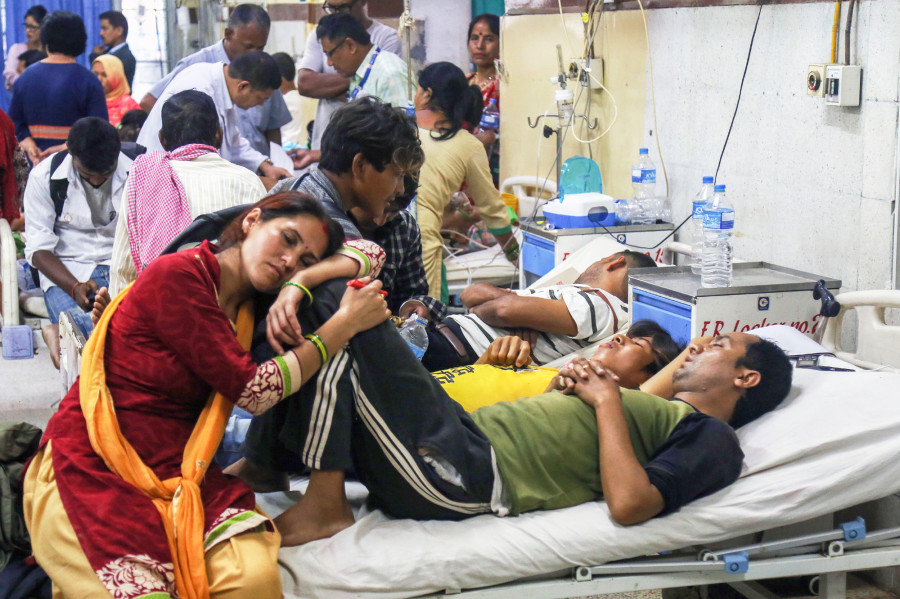Health
Government lacks budget for free emergency service, screening for non-communicable diseases
Upon their appointment, health ministers promise big but without ensuring budget to fulfil them, say health ministry officials.
Arjun Poudel
Doctors serving at the emergency department of the Tribhuvan University Teaching Hospital often encounter questions about whether emergency services are free at the hospital.
Patients have to pay for each and every service provided by the hospital, and their relatives question why they are forced to pay for the services when the government has declared that they are for free.
“No government agency ever asked us not to charge money for emergencies and neither did we get any budget to ensure free services to the patients,” Dr Dinesh Kafle, executive director at the hospital, told the Post. “Without the required budget, free services are impossible.”
After appointment, the new minister for health and population Birodh Khatiwada had declared that the state-run health facilities will not charge for emergency services. The minister announced that the government will also provide free screening for certain non-communicable diseases to people above 40 years old from the next fiscal year.
Establishing a 25-bed rehabilitation centre each in all the seven provinces in the fiscal year 2022-2023 was another plan of the Health Ministry. These centres would provide treatment and care to people who suffered serious head and spinal cord injuries.
Free screening of cervical cancer is another programme announced by the government in the past that is yet to be implemented.
The Tribhuvan University Teaching Hospital is renowned for its quality care at affordable price. The hospital sees more than 2,000 patients daily in its out-patient department and an additional 400 in its emergency department. Doctors serving throughout the country refer the seriously ailing patients to the hospital as it is also the national referral centre.
“It would be good if the government had announced the programmes after necessary homeworks,” said Kafle. “We have not received a single penny to provide free emergency care.”
Officials at the Health Ministry say that announcements by the minister and ministry were also in line with a report that said Nepali patients having non-communicable diseases had surpassed those with communicable diseases long ago.
A 2019 study on the prevalence of non-communicable diseases by the Nepal Health Research Council found that non-communicable diseases accounted for 71 percent of the deaths in the country.
The study was primarily focused on behavioural risk factors, such as tobacco and alcohol consumption, and biological ones such as raised blood pressure, overweight, obesity, abnormal lipid prevalence, coronary artery disease, chronic obstructive pulmonary disease and diabetes.
Doctors say a majority of the people do not undergo testing unless it is an emergency and most do not know if they are suffering from serious ailments. They say that a lot of lives could be saved if the testing of the non-communicable diseases is made free.
The study showed that hypertension, diabetes, renal function, liver function, heart problems, and cervical cancer are responsible for the majority of morbidity and mortality in the country.
While announcing the free treatment programme, health ministry officials had said that from 2023, people above 40 years old will get free testing for hypertension, diabetes, renal function, liver function, heart problems, and cervical cancer. They said that the screening campaign will start as a pilot project in eight districts at the initial stage and that it will be expanded throughout the country.
“We reached the conclusion that starting the testing of non-communicable diseases free of cost immediately is impossible and our budget does not support it,” said Dr Phanindra Baral, chief of the mental health section at the Epidemiology and Disease Control Division. “We found that Rs1,800 is needed to carry out testing of non-communicable diseases for each individual.”
The ministry instead allocated Rs250,000 to each metropolis and sub-metropolis to start testing of blood sugar.
No budget has been allocated for municipalities and rural municipalities.
Health Ministry officials concede that no local metropolis or sub-metropolis has started providing free screening of blood sugar levels.
It is estimated that a lot of people do not seek basic healthcare services even in emergencies due to lack of money.
Cervical cancer is the second-most prevalent cancer and the third-most common type of cancer after breast and lung cancer in women, according to doctors.
Public health experts say the increase in cases of non-communicable diseases is a global phenomenon, but they affect developing countries like Nepal more.




 18.12°C Kathmandu
18.12°C Kathmandu















